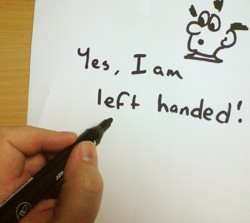- Joined
- Mar 12, 2011
- Messages
- 13,882
- Location
- The Netherworld
Right-handers have long accounted for 90 percent of the population, and scientists may have figured out why

Only one out of every 10 people are predisposed to favor their left hand instead of their right, "a ratio that has remained constant for more than 5,000 years," says Rick Nauert at PsychCentral. Why isn't there a 50-50 righty-lefty split? Why aren't all of us right-handed? New research from Northwestern University may have the answer. Here's what you should know:
What exactly is this new theory?
Researchers are positing that the steadily low percentage of lefties "is a result of the balance between cooperation and competition in human evolution." Humans have long had an evolutionary need to cooperate, such as when sharing tools or hunting in groups. And if most people use the same hand, it makes such cooperation easier. "The more social the animal — where cooperation is highly valued — the more the general population will trend toward one side," says co-author Daniel M. Abrams.
Then why aren't we all right-handed?
Because people aren't purely cooperative. We compete with each other, too, and always have. "If a society was totally cooperative, then everyone would be same-handed," says Nauert. But that's not us. Our competitive streak ensures that there will always be lefties.
Why does competitiveness foster left-handedness?
Physical competition "favors the unusual," Nauert says. For example, "in a fight, a left-hander in a right-handed world would have an advantage."
What proof do researchers have?
To showcase the validity of their model, researchers turned to sports like boxing, fencing, and table tennis. In athletics, lefties are "overrepresented to the tune of about one in five," says AFP, underscoring the competitive advantage of left-handedness. And the inverse is true for sports where handedness isn't a factor. For example, "the number of successful left-handed PGA golfers is very low, only 4 percent," says PhysOrg.

Only one out of every 10 people are predisposed to favor their left hand instead of their right, "a ratio that has remained constant for more than 5,000 years," says Rick Nauert at PsychCentral. Why isn't there a 50-50 righty-lefty split? Why aren't all of us right-handed? New research from Northwestern University may have the answer. Here's what you should know:
What exactly is this new theory?
Researchers are positing that the steadily low percentage of lefties "is a result of the balance between cooperation and competition in human evolution." Humans have long had an evolutionary need to cooperate, such as when sharing tools or hunting in groups. And if most people use the same hand, it makes such cooperation easier. "The more social the animal — where cooperation is highly valued — the more the general population will trend toward one side," says co-author Daniel M. Abrams.
Then why aren't we all right-handed?
Because people aren't purely cooperative. We compete with each other, too, and always have. "If a society was totally cooperative, then everyone would be same-handed," says Nauert. But that's not us. Our competitive streak ensures that there will always be lefties.
Why does competitiveness foster left-handedness?
Physical competition "favors the unusual," Nauert says. For example, "in a fight, a left-hander in a right-handed world would have an advantage."
What proof do researchers have?
To showcase the validity of their model, researchers turned to sports like boxing, fencing, and table tennis. In athletics, lefties are "overrepresented to the tune of about one in five," says AFP, underscoring the competitive advantage of left-handedness. And the inverse is true for sports where handedness isn't a factor. For example, "the number of successful left-handed PGA golfers is very low, only 4 percent," says PhysOrg.
